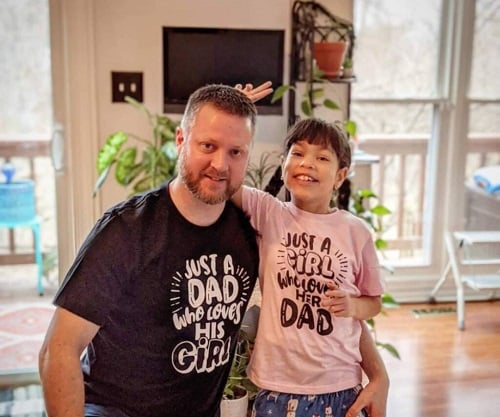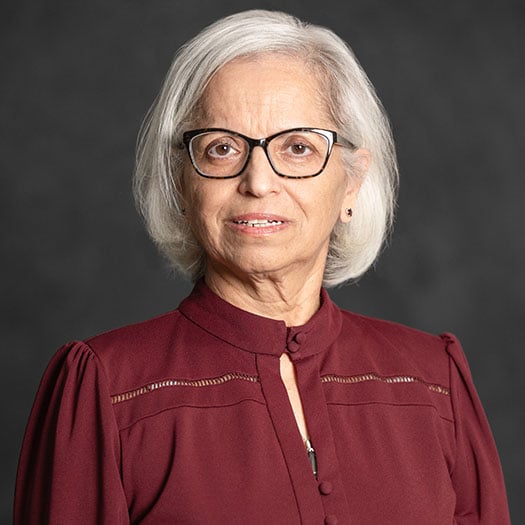
Anna's Story

Heath Alexander of Silver Spring, Maryland, said he waited “on pins and needles” in his doctor’s office at the MedStar Georgetown University Hospital Transplant Institute to learn whether he could help save his daughter’s life. Heath had undergone a rigorous assessment to determine whether he was healthy enough to donate one of his kidneys to his daughter, 11-year-old Anna Sophia Alexander. He and his wife, Geovanna Rybik, had known since viewing Anna’s fetal ultrasounds that she had a condition called hydronephrosis and would eventually require a kidney transplant to live. Anna’s kidney function gradually declined over the years and when it began to decline below 20 percent function, her care team knew it was time to act. Geovanna could not donate due to medical reasons, and Heath was eager to learn whether he could donate his kidney to Anna.
“When they told me the news that I was healthy and able to donate my kidney to Anna, I could not hold back my emotions. I felt so relieved,” he said. Though Anna’s parents had always known she would require a kidney, they only became more aware of the living donor program at Georgetown in recent years when they came to Children’s National Hospital.
“Living donation is something I hope people become more aware of because it is such a relief for patients and families,” Geovanna said. “It opened up so many more options and meant Anna did not have to go on dialysis.” In March 2021, Heath was able to donate his kidney to Anna through a unique partnership between two top institutions for transplant: the MedStar Georgetown University Hospital Transplant Institute, and Children’s National Hospital.
Jennifer (Ehlin) Verbesey, M.D., Director of Living Donor Kidney Transplantation and Director of Pediatric Kidney Transplantation at MedStar Georgetown University Hospital Transplant Institute, said living donation makes it possible to “catch kids in the perfect window” for kidney transplantation.
“Studies have shown that kids have better outcomes if they have preemptive transplants, which are transplants prior to the patient ever entering dialysis. Living donors make preemptive transplants very feasible. We also want patients to have as much time as possible with their own kidneys since kidney transplants do not last forever,” Dr. Verbesey said. “Children may require multiple transplants throughout their lifetime and transplant timing is very important; there is a sweet spot to get the best possible outcome. Having a living donor lets us plan and get the timing exactly right, and living donor kidneys last an additional five or more years on average.”
Dr. Verbesey said direct donation like Heath and Anna’s is just one of several ways people can participate in living kidney donation. Both MedStar Georgetown University Hospital and Children’s National Hospital participate in the National Kidney Registry, a national pool that can help difficult-to-match recipients get transplanted or find more advantageous matches for others. Through this registry, living donors and recipients become part of a pool or chain which allows children to receive kidneys through an exchange program if they are unable to receive kidney directly from their loved ones. Patients can receive living donor kidneys through direct donation, paired exchange donation, family voucher donation or advanced donation.
“Our transplant program is part of a very special partnership with Children’s National that allows kids to have adult living donors who are evaluated and operated on at Georgetown Hospital, while the child recipient is cared for at Children’s National,” Dr. Verbesey said. “Georgetown is a top program in the country for kidney donor transplant, while Children’s National is one of the top hospitals caring for pediatric recipients.”
Asha Moudgil, M.D., specializes in the long-term care of children after transplantation at Children’s National and said the unique partnership between the two institutions provides kidney donors and recipients with unparalleled care before, during, and after transplantation.
“We are both high volume centers, meaning we offer the most robust experience for our patients. The MedStar Georgetown University Hospital Histocompatibility Laboratory offers pre- and post-transplant immune assessment needed for successful outcomes. Children’s National Hospital provides the entire continuum of care with experts in every specialty, including fetal medicine, genetics and metabolism, nephrology, urology and radiology, as well as anything else a patient requiring transplant needs,” Dr. Moudgil said. Having this entire health ecosystem in place is what makes a transplant successful and puts many parents at ease. “Together we can take advantage of our combined experience and give patients the best care possible.”
“I want people who are interested in donating to not rule themselves out,” Dr. Verbesey said. “Even patients with minor health issues do very well after surgery. The donation surgery is very safe and patients are often home the next day. We have many people who come forward to donate without a specific recipient in mind. Donors such as this can help children and families like Anna and others who may not have parents who can donate.” Heath agrees.
“Organ donation sounds scary, but after having gone through it, it was not that bad at all. I listened to my doctors, got ample rest, and now I feel completely fine. If anything, it woke me up about my health and now I drink more water and am committed to eating healthier foods. For my health, it has been very positive,” he said. For Anna, the health benefits are even more obvious.
“Since Anna’s transplant, I hear her giggling, laughing and playing with her puppy, where before she only had the energy to sit with her puppy,” Geovanna said. “She loves animals and wants to be a veterinarian, and now she can run and play with her pets and do what she loves.” In addition to their expertise, Geovanna said the compassion Anna’s care team at Children’s National showed made a huge difference. In particular, Anna enjoyed visits from Child Life Specialist Judy Ross and comfort dog Barney, a golden retriever. Geovanna even nominated a nurse, Sarah Kramer, for a nursing award because of the compassion she showed Anna at the hospital.
“Everyone asked Anna about her interest in animals and treated her like she was one of a kind. As a mom, that was very comforting. Everybody was so gentle and kind to her. People would ask me what I needed, too, because especially during a pandemic as a parent, it is very hard to never get a break. It was exhausting, but everyone was so accommodating and took good care of us,” Geovanna said.
If there is one thing she wants other parents to know about the kidney transplant process at Children’s National, she said, one word comes to mind.
“Trust. Trust that these are people who truly care about your child and love their job. It is a very personalized process for each child. They know you, they know your child, and they never treat you like just a number. Your care team will become like a big family.”



